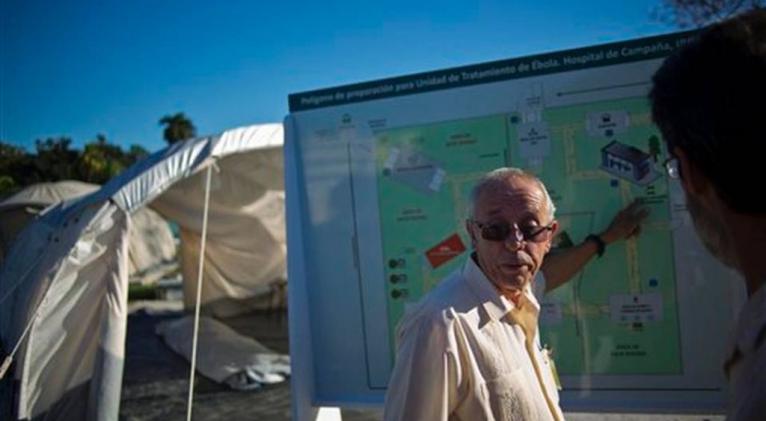Praise Comes From Different Corners for Cuba’s Fight Against Ebola
especiales

The New York Times joins the U.N. Special Envoy on Ebola and the leaders of ALBA nations in lauding Cuba’s impressive efforts against the deadly disease in West Africa.
The U.N. Special Envoy on Ebola, David Navarro, arrived in Havana on Sunday to participate in the Extraordinary Summit of the Bolivarian Alliance of the Peoples of Latin America (ALBA) on Ebola to begin on Monday.
Navarro hailed the contributions of Cuba in attacking the Ebola epidemic in West Africa, particularly in Sierra Leone, where a contingent of 165 health care professionals, including some from Venezuela, are hard at work.
"You are providing impressive support to African people now, as you have done for many years," said the special envoy.
He told the press that Cuba “is providing a high level of solidarity… and it is gratifying to know that the government has agreed to cooperate with other governments.“
Navarro said that on Monday, he will speak of the “threat posed by the outbreak of Ebola in the world, and the courage of those who are helping those who have fallen ill with the disease.”
Delegations to the Summit from Venezuela, St. Lucia and Granada also expressed their appreciation for Cuba’s work in protecting those that are most vulnerable to tropical diseases and implementing plans to prevent the onset of the virus in their nations.
Praise for Cuba’s impressive role in combating Ebola also came from the editors of the New York Times, who only last week called for an end to the embargo against the island nation.
This Sunday’s Times editorial noted that “an impoverished island that remains largely cut off from the world and lies about 4,500 miles from the West African nations where Ebola is spreading at an alarming rate… has pledged to deploy hundreds of medical professionals to the front lines of the pandemic.”
It contrasted the role of Cuba in confronting the disease to that of the world’s richest nations: “While the United States and several other wealthy countries have been happy to pledge funds, only Cuba and a few nongovernmental organizations are offering what is most needed: medical professionals in the field.”
“While the United States and several other wealthy countries have been happy to pledge funds, only Cuba and a few nongovernmental organizations are offering what is most needed: medical professionals in the field.” NYT
U.S. Secretary of State John Kerry did offer a few words of begrudging support for Cuba’s efforts on Friday as he praised “the courage of any health care worker who is undertaking this challenge,” noted the editorial, which goes on to say that Cuba has a long tradition of sending doctors and nurses to disaster areas abroad and even offered to send doctors to New Orleans in the aftermath of Hurricane Katrina in 2005.
The NYT describes the small nation’s current work in West Africa:
“With technical support from the World Health Organization, the Cuban government has trained 460 doctors and nurses on the stringent precautions that must be taken to treat people with the highly contagious virus. The first group of 165 professionals arrived in Sierra Leone in recent days. José Luis Di Fabio, the World Health Organization’s representative in Havana, said Cuban medics were uniquely suited for the mission because many had already worked in Africa.”
The editors also echoed the sentiments about the negative role of the U.S. embargo against Cuba, expressed by the Uruguayan official who said that in spite of the fact that Cuba has excellent doctors, the country’s "efforts to aid in health emergencies abroad are stymied by the embargo the United States imposes on the island, which struggles to acquire modern equipment and keep medical shelves adequately stocked."
Fidel Castro’s argument in a column published over the weekend in Granma, in which he argues that the United States and Cuba “must put aside their differences, if only temporarily, to combat a deadly scourge,” prompted a closing comment by the editors of the influential New York Times: “He’s absolutely right.”













Add new comment